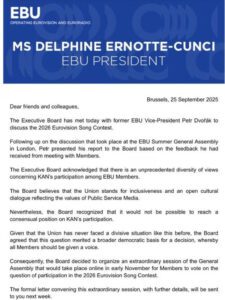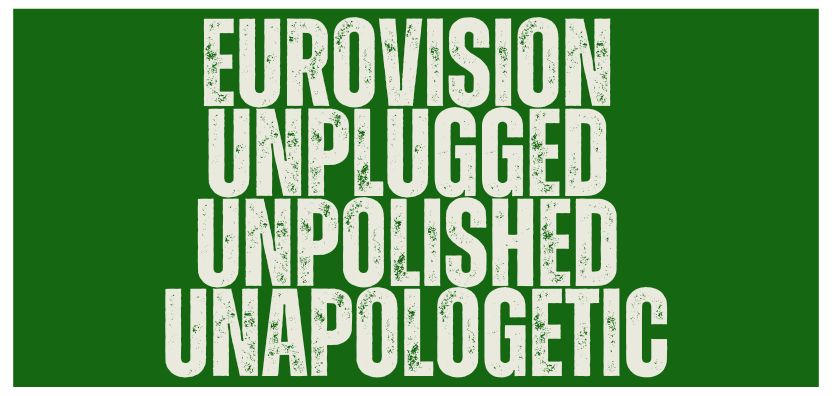
|
Getting your Trinity Audio player ready...
|
The European Broadcasting Union has called an unprecedented vote for early November to decide whether Israel can participate in Eurovision 2026, marking the first time in the contest’s 70-year history that a member country’s participation will be decided by democratic ballot among all EBU members.
The Vote Details and Requirements
 The EBU Executive Board announced the extraordinary online General Assembly meeting after acknowledging “unprecedented diversity of views” among its 68 member broadcasters regarding Israel’s participation. The vote will require only a simple majority (more than 50% of votes cast) to exclude Israel, despite Israeli broadcaster KAN’s claims that EBU statutes require a 75% supermajority for “extraordinary decisions”.
The EBU Executive Board announced the extraordinary online General Assembly meeting after acknowledging “unprecedented diversity of views” among its 68 member broadcasters regarding Israel’s participation. The vote will require only a simple majority (more than 50% of votes cast) to exclude Israel, despite Israeli broadcaster KAN’s claims that EBU statutes require a 75% supermajority for “extraordinary decisions”.
According to EBU statutes, the 75% requirement in Article 5.9 applies specifically to “cessation of membership or expulsion of a Member” from the EBU itself, not participation in Eurovision. The EBU clarified to multiple outlets that this lower threshold applies because Israel’s EBU membership is not in question – only its Eurovision participation. Kan would need to secure the support of at least 35 countries out of the 68 expected to vote.
Former EBU Vice-President Petr Dvořák compiled a report based on feedback from member broadcasters over recent months, but the EBU board “recognised that it would not be possible to reach consensual position on KAN’s participation,” necessitating the democratic vote.
Growing Boycott Coalition
Five countries have officially declared they will withdraw from Eurovision 2026 if Israel participates:
- Spain– The first “Big Five” country to take this stance, with its RTVE board voting 10-4-1 in favor of withdrawal.
- Ireland– RTÉ called participation alongside Israel “unconscionable given the ongoing and appalling loss of lives in Gaza”.
- Netherlands – AVROTROS stated it could no longer justify Israel’s inclusion due to “human suffering” and “suppression of press freedom”
- Slovenia – RTVSLO made participation contingent on EBU decisions regarding Israel.
- Iceland – RÚV has reserved the right to withdraw and senior staff indicate participation is unlikely if Israel competes.
Additional countries including Belgium’s VRT and Finland’s Yle have raised concerns, with Belgium’s Flemish broadcaster supporting the withdrawal position while awaiting a December decision from French-language RTBF, which handles Belgium’s 2026 participation.
Countries Supporting Israel’s Participation
Several nations have explicitly backed Israel’s continued participation:
- Germany – Broadcaster Südwestrundfunk is in direct contact with the EBU supporting Israel, with Culture Minister Wolfram Weimer stating that “Eurovision was founded to bring nations together through music” and excluding Israel “goes against this fundamental idea”.
- Austria – As host country, ORF’s board voted by majority to support Israel’s participation, with Lower Austria governor Johanna Mikl-Leitner declaring “A Song Contest without Israel is unthinkable”.
- France – France Télévisions confirmed participation regardless of Israel’s status, “reaffirming its support for musical creation, to artists, and for this unique event”.
Other supporters reportedly include Switzerland, Greece, Azerbaijan, Cyprus, and Australia. Former Israeli delegation member Amir Alon claimed Germany and Italy had threatened to withdraw if Israel were excluded, though Italy’s RAI has made no official statement.
UN Genocide Finding Adds Pressure
The timing coincides with a September 16 UN Commission of Inquiry report concluding that “Israeli authorities and Israeli security forces have committed and are continuing to commit genocide against the Palestinians in the Gaza Strip”. The report specifically found that Israeli President Isaac Herzog, Prime Minister Benjamin Netanyahu, and former Defense Minister Yoav Gallant “have incited the commission of genocide”.
This UN finding has been cited by boycotting countries as additional justification for their positions, with Spain’s Culture Minister Ernest Urtasun directly referencing the genocide determination.
Financial and Logistical Implications
Spain’s withdrawal as a “Big Five” contributor – which alongside the UK, Germany, France and Italy provides significant funding and automatic final qualification – represents the most serious financial threat to Eurovision’s stability. The “Big Five” system was created specifically to ensure major financial contributors maintain guaranteed participation.
The EBU has extended the participation deadline from October 13 to mid-December, providing broadcasters additional time to finalize decisions following the November vote. This procedural change acknowledges the unprecedented nature of the situation and allows countries to respond to the vote outcome.
Historical Context and Precedent
While Russia was excluded from Eurovision 2022 following its invasion of Ukraine, that decision was made unilaterally by the EBU citing that Russian participation would “bring the competition into disrepute”. The current situation marks the first time the EBU has resorted to a democratic vote among all members to resolve participation disputes.
Israel has participated in Eurovision 47 times since 1973, winning four times and never finishing last in the contest. The country’s recent performances have been controversial, with second-place finishes in both 2024 and 2025 amid protests and accusations of vote manipulation.
The December Deadline
The November vote will determine Israel’s fate well before the mid-December deadline for final participation confirmation without financial penalty. This timeline ensures all affected broadcasters can make informed decisions about their own participation based on the vote outcome.
The 70th Eurovision Song Contest is scheduled for May 12, 14, and 16, 2026, at Vienna’s Wiener Stadthalle, with Austria hosting after JJ’s victory at the 2025 contest in Basel.





